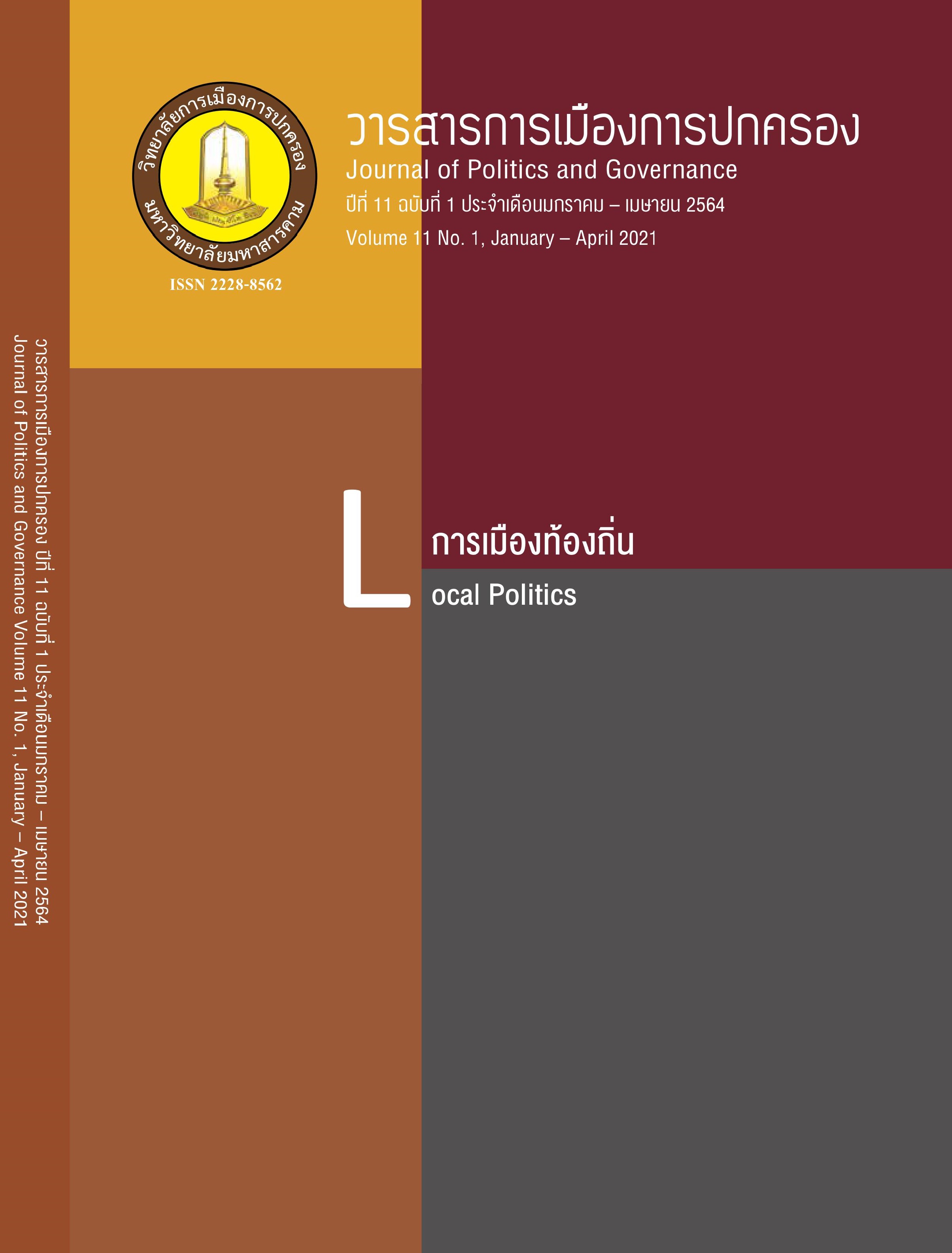Reviewing the literature of water resource management : Case Studies of Kuta and Sanur Area in Bali Province of Indonesia
Main Article Content
Abstract
This academic article reveal the literature of water resource management which will lead to the study of the Politics of Water Policy Making Process in Indonesia Case Studies Kuta and Sanur Area in Bali Province of Indonesia. This article based on the Institutional analysis and development framework of Elinor Ostrom which emphasizes on community actors. Moreover, researcher has reviewed more than 30 research papers of water resource management and water governance and found that no matter the water management succeed or fail , 3 factors (Path Dependencies , Norms and Interests) will always be involved. However , other than those 3 factors and community , the external factors such as local government and stakeholders still have an important roles to mitigate the conflict over common pool resources.
Article Details
References
สมิตา วงศ์เฉลิมสุข. (2558). ทรัพยากรธรรมชาติของแต่ละประเทศในอาเซียน. ค้นเมื่อ 16 สิงหาคม 2561. สืบค้นจาก https://samita2039.wordpress.com/2015/02/01/hello-world/
อัมพร ธำรงลักษณ์ และคนอื่นๆ. (2553). การบริหารปกครองสาธารณะ (Public governance) การบริหารรัฐกิจในศตวรรษที่ 21. กรุงเทพฯ: โครงการตำราคณะรัฐศาสตร์ มหาวิทยาลัยธรรมศาสตร์.
Blomquist, William & Schlager, Edella. (2005). Political Pitfalls of Integrated Watershed Management. Society & Natural Resources: An International Journal, 18(2), 101-117.
Brown, R.R., Ashley, R. & Farrelly, M.A. (2011). Political and professional agency entrapment: an agenda for urban water research. Water Resources Management, 25(15), 4037-4050.
Brown, Rebekah. (2005). Impediments to Integrated Urban Stormwater Management: The Need for Institutional Reform. Environmental Management, 36(3), 455-468.
Castro, J.E., Kaika, Maria & Swyngedouw, Erik. (2003). London: Structural Continuities and Institutional Change in Water Management. European Planning Studies, 11(3), 283-298.
Doukkali, Mohammed Rachid. (2005). Water institutional reforms in Morocco. Water Policy, 7, 71–88.
Fischhendler, Italy. (2008). Institutional Conditions for IWRM: The Israeli Case. Ground Water, 46(1), 91-102.
Heclo, H. (1978). Issue Networks and the Executive Establishment. The New American Political System. Washington D.C.: AEI.
Ingram, Helen & Schneider, Anne. (2005). Public Policy and the Social Construction of Deservedness. In Deserving and Entitled, 1-34. Schneider, Anne and Helen Ingram. Albany, NY, USA: SUNY Press.
Ingram, Helen & Fraser, Leah. (2006). Path Dependency and Adroit Innovation: The Case of California Water. In Punctuated Equilibrium and the Dynamics of U.S. Environmental Policy, 78-109. Robert C. Repetto. (Ed). New Haven, USA: Yale University Press.
Jessop, Bob. (2003). Governance and Metagovernance: On Reflexivity, Requisite Variety, and Requisite Irony. The Department of Sociology, Lancaster University. Retrieved from http://www.lancaster.ac.uk/fass/resources/ sociology-online-papers/papers/jessop-governance-and-metagovernance.pdf. 1-12.
Kemper, K., Blomquist, W. & Dinar, A. (2007). Integrated river basin management through decentralization. New York, USA: Springer.
Kjoer, Anne Mette. (2006). Governance. Cambridge, UK: Polity Press.
Kobrak, Peter. (2002). The Political Environment of Public Management. London: Longman. 335.
Kumler, L. M.. & Lemos, M.C. (2008). Managing waters of the Paraíba do Sul river basin, Brazil: a case study in institutional change and social learning. Ecology and Society, 13(2), 22.
Lemos, Maria Carmen & Oliveira, J.L.F. (2004). Can Water Reform Survive Politics? Institutional Change and River Basin Management in Ceara´, Northeast Brazil. World Development, 32(12), 2121-2137.
Liu, C., Wang, Z.Y. & Sui, J.Y. (2007). Analysis on variation of seagoing water and sediment load in main rivers of China. Journal of Hydraulic Engineering, 38, 1444-1452.
MacIntyre, Andrew. (2002). The Power of Institutions: Political Architecture and Governance. Ithaca, NY: Cornell University Press.
McKay, Jennifer. (2005). Water Institutional reforms in Australia. Water Policy, 7, 35-52.
Meinzen-Dick, Ruth. (2007). Beyond panaceas in water institutions. Proceedings of the National Academy of Sciences of the United States of America, 104(39), 15200-15205.
Miller, E. & Buys, L. (2008). Water-recycling in South East Queensland, Australia: What do men and women think? Rural Society, 18(3), 220-229.
National Archives of Singapore. NEWater outreach wins UN-Water award. (2014). Retrieved from http://www.nas.gov.sg/archivesonline/data/pdfdoc/ 20140328001/pub_press_release_21mar2014.pdf.
NEW18. หญิงชาวอินโดยังต้องว่าย 4 กิโลหาน้ำดื่มในวันน้ำโลก. (2561). สืบค้นจากhttp://www.newtv.co.th/news/13331
Nigussie, Zerihun et al. (2017). Applying Ostrom’s institutional analysis and development framework to soil and water conservation activities in north-western Ethiopia. Land Use Policy, 71, February, 2018, 1-10.
Ostrom, Elinor. (1991). Governing the commons: the evolution of institutions for collective action. Cambridge: Cambridge University Press.
Pahl-Wostl, Claudia. (2007). Transitions towards adaptive management of water facing climate and global change. Water Resource Management, 21, 49-62.
Rhodes, R.A.W. (1997). Understanding Governance: Policy Networks, Governance, Reflexivity and Accountability. Maidenland: Open University Press.
Watson, N., Deeming, Hugh & Treffny, Raphael. (2009). Beyond Bureaucracy? Assessing Institutional Change in the Governance of Water in England. Water Alternatives, 2(3), 448-460.
World Bank. (2012). Managing Development : The Governance Dimension. Retrieved from http://www.worldbank.org.
Unicef. (2557). World Water Day: ประชากรยากจน 768 ล้านคนยังขาดน้ำสะอาด. สืบค้นจาก https://www.unicef.org/thailand/tha/media_22286.html


